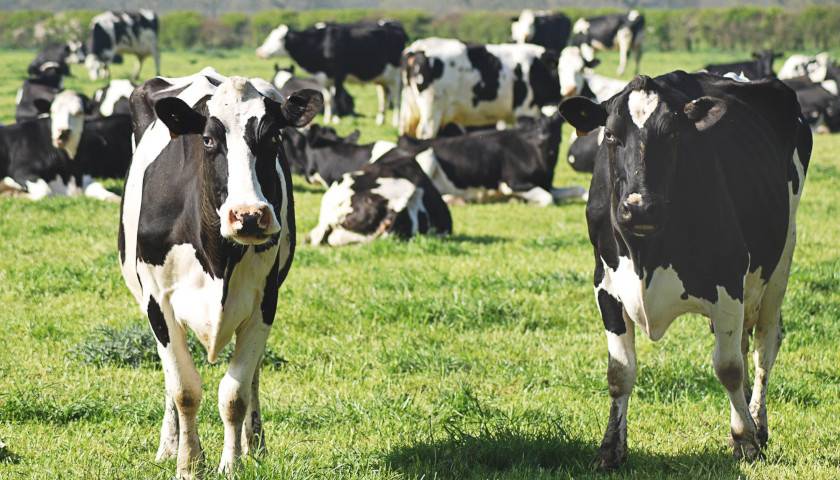by Kevin Killough
The United Nations is expected to ramp up its calls for the world to greatly reduce meat consumption in order to combat climate change.
During the COP28 climate summit, which starts Thursday in Dubai, the UN’s Food & Agriculture Organization (FAO) will publish a global plan calling on nations with high rates of meat consumption to change their diets in order to lower greenhouse gas emissions, according to Bloomberg News.
The document isn’t legally binding, but it is expected to have influence over policymakers who are setting more and more rules to fight climate change.
“It’s unclear which will come first: the UN taking away your hamburger or Joe Biden confiscating your gas stove so you can’t cook it,” said Daniel Turner, founder and executive director for Power The Future.
The roadmap, Bloomberg reports, will ask wealthy nations with high rates of per-capita meat consumption to curtail their carnivorous habits, and developing countries will be advised to improve their livestock raising and farming practices.
Livestock produces methane through their burps, contrary to conventional understanding of from which end of the animal the gas is produced.
With about three-quarters of a pound of meat consumed per person per day, the United States has the second highest rates in the world, following Hong Kong.
Globally, according to the FAO, livestock production accounts for 14.5 percent of all man-made greenhouse gas emissions.
In the United States, the entire agriculture sector accounts for 8.6 percent of emissions, and livestock production accounts for 36 percent of the sector’s total emissions, or 3.1 percent of all U.S. greenhouse gas emissions, which have been declining since 2005.
The livestock industry, especially the beef sector, has increasingly become a target for fighting global warming over the past few years. At the extreme end of the conversation, people are encouraged to give up meat in favor of insects, but the European Union has implemented livestock regulations that may force Ireland’s producers to cull their herds. The regulations have also led to widespread protests in the Netherlands.
Sustainability is a goal for much of the U.S. agriculture industry. The National Cattlemen’s Beef Association (NCBA), for example, aims to be carbon neutral by 2040.
Ethan Lane, vice president of government affairs for the NCBA, told Just The News that the delegates gathering at COP28 should consider better ways to address greenhouse gas emissions from agriculture than reducing meat consumption.
“We call on them to look at solutions holistically. Solutions that seek to reduce meat consumption are misguided and will only lead to limited consumer choice and higher food prices. At a time when malnutrition plagues countries across the world, a reduction of high-quality animal protein would disproportionately impact consumers who can ill-afford to pay more and are ultimately at the highest risk of malnutrition,” Lane said.
For American cattle producers, the allegations of livestock as a major source of pollution ignores its commitments to sustainability.
Some advocates are fighting back. In 2020, Michelle Miller, an agricultural advocate who goes by the moniker “Farm Babe,” went after Burger King when it produced a commercial that she saw as exaggerating the industry’s small contribution to emissions. Miller was able to open up a dialogue with the company following the controversy.
“American farmers and ranchers are the backbone of this country’s food supply, and they don’t need outsiders trying to undermine what they do. “They deserve our gratitude,” Larry Behrens, Power The Future western states director, said in an interview.
Justin Tupper, president of the U.S. Cattlemen’s Association, told Just The News that the demonization of the livestock industry ignores the benefits it provides. While often being portrayed as gobbling up large amounts of valuable agricultural land, Tupper said that’s not the case, because absent the livestock industry, that land couldn’t be put toward raising crops.
“We use country and grassland that’s not tillable. You can’t use it for anything else. And then we turn it into a very usable protein,” Tupper said. The grasslands of the Great Plains were once covered with tens of millions of buffalo, and those animals played a vital role in the health of the ecosystem of the Great Plains. With the buffalo gone, some of that role is taken up by cattle.
“The buffalo were farting through this country all that time, and we didn’t have any issues with the climate system,” Tupper said.
Brett Moline, spokesperson for the Wyoming Farm Bureau, said it seems that no matter how much the industry pursues sustainable grazing and farming practices, the climate activists wanting to reduce or eliminate meat consumption never seem to notice. “It gets so frustrating,” Moline said in an interview.
While the FAO will ask the people of developed countries to consume less meat, it remains to be seen if those countries will follow the suggestions. “Thanksgiving is my one concession to the turkey industry. But no, people want the nutritional quality of beef. You just can’t beat it,” Moline said.
Should the world consumers continue to demand increasing amounts of meat, the question is how policymakers will respond. As has been seen in Europe, “recommendations” – especially if pushed by a populist agenda, like “going green” – can become law. For America’s cattle industry, such laws may do more harm than good.
“Reducing beef consumption in the U.S. is not a realistic or impactful solution for climate change. America’s beef producers and consumers around the globe deserve real solutions to the climate issue, not artificial barriers to protein consumption that will do nothing to solve the world’s climate issues,” the NCBA’s Lane said.
– – –
Kevin Killough is a reporter for Just the News.




